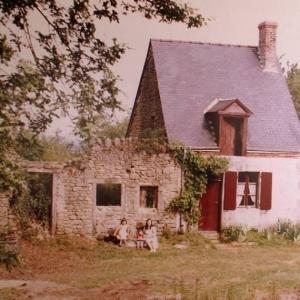Life at Les Pierres, especially in Spring and Summer, seems to revolve around the vegetable garden and various other green area’s that play an important role in our sustenance, literally and figuratively speaking. It’s not just lack of funding, knowledge, skills, motivation or energy that diverts attention from the ruin next door, leaving it as the sensational backdrop I proclaimed it to be earlier this week.
The experience of reclaiming parts of it when I was building our terrace last year, manually digging up the stones I used to create the surrounding walls, has made me more aware of the necessity to carefully weigh what to touch and what not. It’s not so much the fear of destroying the historical structure that keeps me from tackling the weeds and care for the crumbling walls (but it’s a great excuse for not having to do anything), it is rather easy to demolish the magical ambiance by doing so.
Heat has not yet come in and rain has been copious enough for everything to start bursting with life. Nature’s proprietary is evident and I am in awe of how she balances out what was and will become of our precious premises.
Curious about the progress she has made with it? Check this picture of Les Pierres in the seventies. Same place, different charm.
An important role in our sustenance
Trying to make ones life sustainable is more than a personal choice and almost automatically leads to a multitude of decisions you have never even thought of before. On this website we share what works for us, or woefully no longer works, obviously without claiming the same for you.
We hope that our journey towards a supplementary comprehensive celebration of nature’s beauty might just clear a pathway forward for you too, perhaps challenges a revealing reconsideration, or simply provides for an equally indispensable diversion.
Can we change the world through food? We believe we can and we support Slow Food, a global movement of local communities and activists across more than 160 countries. Together we defend cultural and biological diversity, promote food education and the transfer of traditional knowledge and skills.



